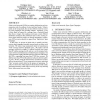Free Online Productivity Tools
i2Speak
i2Symbol
i2OCR
iTex2Img
iWeb2Print
iWeb2Shot
i2Type
iPdf2Split
iPdf2Merge
i2Bopomofo
i2Arabic
i2Style
i2Image
i2PDF
iLatex2Rtf
Sci2ools
126
click to vote
CCS
2010
ACM
2010
ACM
Detecting and characterizing social spam campaigns
Online social networks (OSNs) are popular collaboration and communication tools for millions of users and their friends. Unfortunately, in the wrong hands, they are also effective tools for executing spam campaigns and spreading malware. Intuitively, a user is more likely to respond to a message from a Facebook friend than from a stranger, thus making social spam a more effective distribution mechanism than traditional email. In fact, existing evidence shows malicious entities are already attempting to compromise OSN account credentials to support these "high-return" spam campaigns. In this paper, we present an initial study to quantify and characterize spam campaigns launched using accounts on online social networks. We study a large anonymized dataset of asynchronous "wall" messages between Facebook users. We analyze all wall messages received by roughly 3.5 million Facebook users (more than 187 million messages in all), and use a set of automated techniques to d...
| Added | 06 Dec 2010 |
| Updated | 06 Dec 2010 |
| Type | Conference |
| Year | 2010 |
| Where | CCS |
| Authors | Hongyu Gao, Jun Hu, Christo Wilson, Zhichun Li, Yan Chen, Ben Y. Zhao |
Comments (0)

